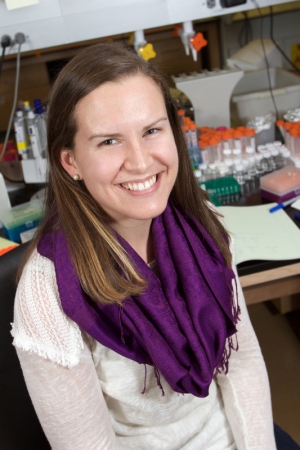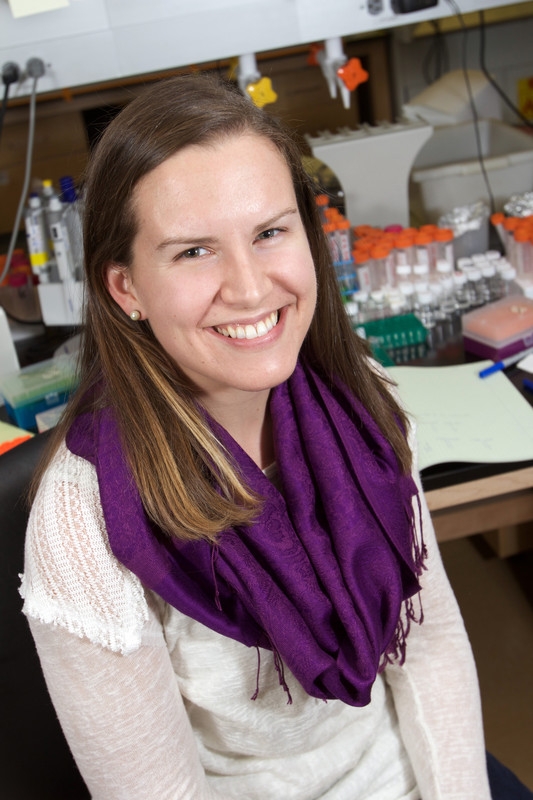Why did you become a biologist (and specifically the type of biologist you are)?
Microbes are fascinating! Each one of us has trillions of microbes that live in and on us, and in fact, we contain more microbial cells than human cells. Even the environment around us is teeming with microbial life. These microbes are important for most aspects of daily life including helping to grow and break down the foods we eat, protecting us from harmful pathogens, and impacting overall health and disease progression. I decided to become a microbiologist when I learned how crucial microbes are for human health and for supporting life on the planet. Not only that, but I am also fascinated by how much more there is to discover about them. We are constantly finding new ones and learning more about the amazing things they can do, including performing complex chemistry, producing specialized molecules, and coordinating behavior.
When did you know this was your career choice (Discuss the process through which you ended up choosing this as a career.)?
My love of science and microbes started with a love of problem-solving and a love of chemistry. Once I got to college and started doing reactions in organic chemistry lab, I was hooked. I discovered that I could build new compounds, and I could solve a “puzzle” to determine the structure of that new compound. I was able to do undergraduate research finding and solving the structures of compounds made by bacteria, which lead me to my Ph.D. work that used bacteria as microscopic factories to do complicated chemistry and make diverse and complex molecules. It was during this time that I ended up working on a collaborative project with a lab in the Biology Department that looked at how soil microbes interact with one another. I enthralled that bacteria could not only do complex chemistry, but also used chemistry to interact with one another and their environment. As I learned more about the important role this plays in human health through interactions with our own gut microbes, I knew that was what I wanted to study. Now I get to combine all of these interests to look at how bacterial interactions influence gastrointestinal health and inflammation. Plus, I get to share my wonder of the microscopic world with students and get their fresh perspectives in and out of the classroom.
Who or what is your inspiration?
Students are a constant source of inspiration. I appreciate when they ask questions that I don’t know the answer to yet or that science hasn’t answered yet. I love their contagious excitement over an interesting result and the creative ideas that they bring to the table.
If you had to do it again, what would you be?
I can’t really imagine doing anything else. Getting to study microbes and work with students is the best!
What courses do you currently teach?
I am currently teaching microbiology lab.
Are you planning to teach any new courses in the near future?
I would love to work on a research-focused course on microbiomes.
What do you like most about teaching?
I intentionally structure courses to create opportunities for direct interactions with students. My favorite time in the classroom is when students are actively working together, and I have the opportunity to walk around and engage with smaller groups of students. This provides daily, mentorship moments to encourage students, learn from their discussions and thought processes, and listen to their personal, educational, and career goals. I almost always come away energized and excited about science.
What is the overarching goal of your research program?
I am interested in the dynamic relationship between resident, gut microbes, and how this ultimately impacts inflammation and the digestive health of their hosts. Inflammatory conditions, such as Crohn’s disease, are associated with changes to the gut microbial community and an increase in Escherichia coli (E.coli). My lab employs a collection of clinical isolates of Crohn’s disease-associated E.coli along with a novel molecular barcoding technique that helps distinguish individual strains of E. coli in a complex community. We use this technique to explore mechanisms by which resident, non-pathogenic bacteria engage in interactions that impact microbial ecology and host health. Characterizing the interactions and molecular features of these strains, highlights microbial targets we can further utilize in the diagnosis and treatment of Crohn’s disease.
What advice do you have for undergraduates/graduates pursuing degrees in biology these days?
First, find what interests you and pursue it! Biology is a broad field that can feed into many different types of careers, so if you also have interests in other areas, such as writing or art, that are careers out there that can combine those things too. Second, ask a lot of questions of yourself, your peers, and your professors. Be curious about what you learn and observe whether or not scientists have figured out the answer. Finally, it is rare that an experiment or hypothesis is completely right the first time. It is okay if something fails. The important thing is learning from it and continuing to grow.

